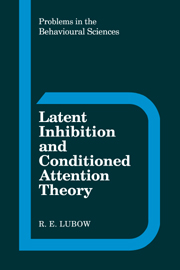Book contents
- Frontmatter
- Contents
- Preface
- 1 Introduction
- 2 Latent inhibition testing procedures
- 3 Variables affecting latent inhibition
- 4 Organismic variables affecting latent inhibition
- 5 Associative learning tests of the effects of stimulus preexposure in children and adults
- 6 Neural substrates of latent inhibition
- 7 Theories and explanations of latent inhibition in animals
- 8 Conditioned attention theory of latent inhibition
- 9 Conditioned attention theory as applied to latent inhibition in humans
- 10 Some applications of conditioned attention theory: learned helplessness and schizophrenia
- Notes
- References
- Author index
- Subject index
- Frontmatter
- Contents
- Preface
- 1 Introduction
- 2 Latent inhibition testing procedures
- 3 Variables affecting latent inhibition
- 4 Organismic variables affecting latent inhibition
- 5 Associative learning tests of the effects of stimulus preexposure in children and adults
- 6 Neural substrates of latent inhibition
- 7 Theories and explanations of latent inhibition in animals
- 8 Conditioned attention theory of latent inhibition
- 9 Conditioned attention theory as applied to latent inhibition in humans
- 10 Some applications of conditioned attention theory: learned helplessness and schizophrenia
- Notes
- References
- Author index
- Subject index
Summary
It is difficult to determine exactly when I began this book, as such. However, the research on latent inhibition was initiated in the late 1950s while I was still a graduate student at Cornell University. The next memorable date for measurement was the publication of an article reviewing the latent inhibition literature in the Psychological Bulletin (1973), which appeared in about half of its original length. The conditioned attention theory of latent inhibition was developed later in a series of articles in the Journal of Experimental Psychology: Animal Behavior Processes in the mid-1970s, and then presented more fully in a chapter in Progress in Learning and Motivation edited by G.H. Bower (1981). The idea of developing this material into a book emerged during a sabbatical year at Yale University, 1977–1978, while much of the writing itself was postponed until another sabbatical, 1981–1982, as an Israel-Canada Fellow at Concordia Unversity. To all of these institutions, and to the individuals who were responsible for inviting me, I express my sincerest gratitude, particularly to Allan Wagner and Eugene Rothman.
In addition, throughout the years I have been fortunate to have my research supported by a number of organizations: The National Institutes of Health were particularly encouraging, especially at the early stages of my career with a Career Development Award. Other support has come from the Scottish Rite Schizophrenia Research Program and, in Israel, from the Charles Smith Psychobiology Fund, the Israel National Academy of Science, Israel Research Trustees Foundation (Ford), and Tel-Aviv Unversity.
- Type
- Chapter
- Information
- Latent Inhibition and Conditioned Attention Theory , pp. ix - xPublisher: Cambridge University PressPrint publication year: 1989

